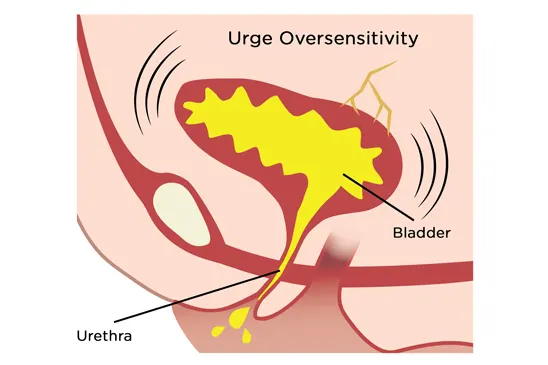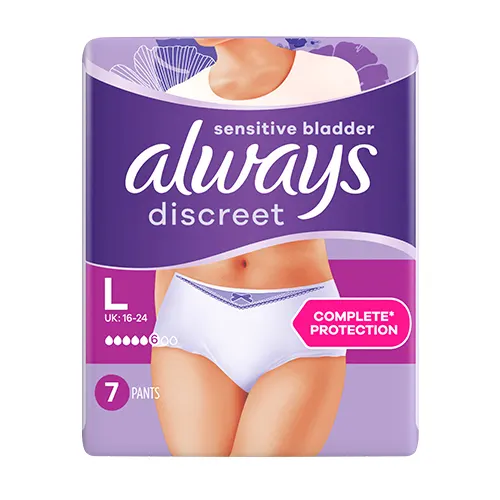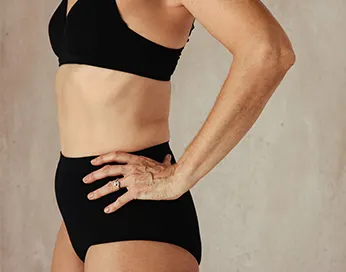
Do you feel the urge to urinate more than 6 to 8 times a day? Do you often feel like the need to run to the toilet, unsure if you’ll make it in time? You may have an overactive bladder, or OAB. It is a condition that affects the muscles of the bladder, causing frequent urination, urinary urgency, and incontinence. Overactive bladder (OAB) also sometimes referred to as an “irritable” or “sensitive” bladder, can be caused by a variety of factors, including nerve damage, hormonal changes, and certain medications.
Table of content:
What is overactive bladder?
Having an overactive bladder is a type of urinary incontinence known as urge incontinence. It is caused when the nerves in and around your bladder are damaged. As a result, your bladder muscles spasm, creating the sensation of a sudden and intense urge to urinate that can send you running to the toilet. Sometimes, you may not make it to the toilet on time. This can happen even when the bladder isn’t full.
The bladder is a muscular sac that stores urine until it is ready to be eliminated. In a healthy bladder, the muscles contract to expel urine when it is full, and the urethral sphincter (the muscle that controls urine flow) relaxes to allow the urine to pass out of the body. However, bladder weakness may cause these muscles to contract involuntarily, leading to a sudden and strong urge to urinate.
Overactive bladder affects millions of people worldwide, with women being more likely to develop it than men. Female overactive bladder is common and can occur at any age, but it is more prevalent in older individuals.
Signs and symptoms of overactive bladder
All of us feel the urge to pee very badly on occasion. This is normal. So how do you know if you have overactive bladder? Symptoms may vary in severity and duration - some experience only occasional urgency, while others may have to urinate every few minutes. Incontinence may occur when the urge to urinate is so sudden and strong that you cannot get to the toilet in time. Here are some overactive bladder symptoms:
- You have to urinate more than 8 times a day.
- The urge to urinate often wakes you up in the middle of the night .
- The urge to urinate comes on so strongly and suddenly that you feel you may not make it to the toilet.
- The unintentional loss of urine that occurs when the bladder contracts involuntarily (incontinence) .
- Difficulty postponing urination after feeling the urge to go .

Causes and risk factors of an overactive bladder
So, what causes an overactive bladder? It is the result of nerve damage to the bladder and pelvic floor, the system of muscles, nerves and ligaments that support the bladder, uterus, and anus. Damage to other parts of the nervous system can also play a part, especially when there’s a hitch in the communication between the bladder and the brain. This means that the brain doesn’t receive proper signals that it’s time to go.
Needless to say, overactive bladder can significantly affect your daily life. While the exact overactive bladder causes may not always be clear, several factors can contribute to the development of that condition. Recognising and understanding these causes and risk factors can help individuals take steps to prevent or manage overactive bladder. The following are most common urge incontinence risk factors for female overactive bladder:
- Urinary tract infection: The irritation and inflammation caused by a urinary tract infection will result in an aggravated and overactive bladder. However, this is temporary. As soon as the infection clears up, your bladder should go back to functioning normally.
- Medications: Some medications can also play a role in the sensitivity of your bladder and the surrounding nerves.
- Obesity, pregnancy and childbirth: Female overactive bladder can be caused by a pregnancy (excess weight and pressure on the pelvic floor over an extended period of time) and possible nerve damage during childbirth (vaginal or C-section) but this is very rare.
- Previous pelvic surgery: any pelvic surgery may have damaged the nerves connected to your pelvic floor and bladder.
- Neurological disease: Diseases that affect the nervous system, such as multiple sclerosis, Parkinson’s, stroke or even diabetes, can create a hitch in the brain’s communication with the bladder muscles as well as in the functioning of the nerves in and around the bladder, resulting in an overactive bladder.
- Bladder abnormalities: Structural irregularities in the bladder, such as bladder stones or tumours, can cause overactive bladder symptoms.
- Genetics: Some studies have suggested that genetics may play a role in the development of overactive bladder.
- Menopause: As we get older, the bladder muscles weaken, and the bladder's capacity to hold urine reduces.
- Constipation: One of overactive bladder causes, chronic constipation can put pressure on the bladder.
- Hormonal changes: The depletion of collagen reduces elasticity of the pelvic muscles during menopause. Changes in oestrogen levels can cause the bladder muscles to weaken, causing incontinence.
How is overactive bladder diagnosed?
Now that we know what causes an overactive bladder, let’s discuss how to diagnose this condition. Determining if someone has overactive bladder involves a comprehensive evaluation of the patient's medical history, symptoms, and physical examination. There are no specific tests to diagnose this ailment, but healthcare providers may use some methods to rule out other medical conditions that can cause similar symptoms. During a medical examination, the doctor asks the patient questions about their medical history and current symptoms, including frequency, urgency, and incontinence. They may also ask about the patient's fluid intake, diet, and lifestyle habits that can affect bladder function.
A physical examination may also be performed to check for any underlying medical conditions that can cause overactive bladder symptoms. The examination may involve checking the abdomen, rectum, and pelvis for any abnormalities or signs of nerve damage. Another type of test is checking for any urinary tract infections, blood in the urine, or other irregularities. Blood tests may also be carried out to check for conditions such as diabetes, which can contribute to nerve damage and overactive bladder symptoms. In some cases, the physician may refer the patient to a urologist or gynaecologist for evaluation, such as urodynamic testing, to check the bladder function and identify any underlying medical conditions.
Overactive bladder prevention and natural treatment
While it may feel overwhelming for some, there are a number of lifestyles changes you can make in order to alleviate or manage overactive bladder symptoms. Most of them are straightforward and easy to implement and can deliver a big pay-off. Read below to find out more about some of the treatments and remedies but always remember that if you have any concerns about bladder leaks, visit your GP as a first step.
Bladder training
Sure, nerve and muscle damage in your bladder can be hard to combat. But this doesn’t mean that it can’t be improved! Just like any other muscle in your body, your bladder can get stronger with a little training. Train your bladder to both lengthen the amount of time between bathroom trips and increase the amount of urine it can hold so that you have more bladder control. Here’s how to do it. Start by holding your urine for five minutes every time you feel the urge to go. When that starts to feel easy, try holding it for ten minutes, and gradually work your way up, strengthening your bladder muscles over time.
Stay on schedule
Another way to train your bladder is to create a toilet schedule for yourself. Use the loo on a fixed schedule – say, every hour, at first. Be sure to go whether or not you feel the urge. Not only does this prevent your bladder from filling up, it also enables you to get into a toilet routine. Once you feel comfortable with your schedule, try increasing the amount of time between each scheduled toilet visit. This way, your bladder muscles will slowly get stronger and grow accustomed to holding more urine in the bladder without spasming.
Double up
This technique is called the 'double empty' method. It makes sure you have emptied all the urine from your bladder. Keeping your bladder empty can reduce the risk associated with a bladder spasm. After all, if there isn’t much in your bladder, you won’t have a big leak if your bladder spasms. This ensures you won’t have a urine emergency just moments after leaving the loo. Here’s how to do it. After you’ve finished urinating, remain on the toilet for 30 seconds, and then urinate again.
Stay hydrated
If you feel the urge to go so intensely, it may be tempting to limit your water intake. This is a big no-no. Not drinking enough water will make your urine more concentrated and acidic. Increased acidity in your urine will aggravate your bladder, induce more spasming, and make your symptoms worse. So, don’t be afraid to drink up! Carry around a water bottle with you wherever you go and take small sips of water to stay hydrated throughout the day. The general recommendation is to drink at least 8 cups (2 litres) of water every day. Bear in mind that the amount of water you need may vary depending on factors like age, sex, activity level, and climate.

Eat and drink with your bladder in mind
Adopting a bladder-friendly diet will go a long way in easing your overactive bladder symptoms. This means avoiding foods that make your urine acidic because acid will further irritate your bladder. This means saying no to caffeine, alcohol, citrus fruits, carbonated drinks, and spicy foods. Also, constipation can put pressure on the bladder and intensify overactive bladder symptoms. This is why eating a diet rich in fibre can help improve overall bladder health. Good sources of fibre include fruits, vegetables, and whole grains.
Wear protection
Wearing protection can give you peace of mind for those moments when you won’t be able to make it to the loo on time. Always has taken their trusted absorbency technology and applied it to urinary products for bladder protection that is comfortable, flexible, and reliably dry. The Always Discreet line has a range of products, including liners, pads and underwear, each tailored to meet your unique absorbency needs. Always Discreet products have an absorbent core that neutralises odours and turns liquid into gel for superior bladder protection that keeps liquid away from your skin, keeping you comfortable. They’re so thin, no one will know you’re wearing one.
Do Kegel exercises
Kegel exercises are pelvic floor muscle exercises that can be beneficial for dealing with the effects of overactive bladder. The pelvic floor muscles support the bladder, urethra, uterus, and rectum, so strengthening them can help prevent bladder weakness. This is done by improving bladder control and increasing the ability to hold urine. Furthermore, it is recommended to seek advice from a specialist women's health physiotherapist who will be able to support you and give you a more adequate solution.
Remember that Kegel exercises may not be appropriate for everyone, especially if you have a medical condition that affects the pelvic floor muscles. Consult your doctor to determine the best course of treatment for you.
Stop smoking
Cigarette smoke contains harmful chemicals that can aggravate your bladder muscles and increase the risk of bladder cancer. Smoking can also damage the nerves that control bladder function, leading to overactive bladder symptoms like urgency, frequency, and urge incontinence . Smoker’s cough can also trigger little leaks of urine. Quitting smoking can be challenging, but it means you get rid of one of potential causes of irritable bladder. Do not forget that there are many resources available to help, including nicotine replacement therapy, counselling, and support groups. Living a healthy lifestyle can greatly improve symptoms of an overactive bladder!
Treatment and medication options for overactive bladder
If you’re not seeing results from behavioural remedies, you may want to seek professional help. Simply consult your healthcare provider or consider trying alternative medicine, such as acupuncture.
Going down the doctor route
You may want to consult your doctor about your medical options. Each has its own advantages and disadvantages, so be sure to weigh each option and choose which is best for you and your lifestyle.
The most obvious solution is medications. Anticholinergics, such as oxybutynin, tolterodine, and solifenacin, work by relaxing the bladder muscles to reduce overactive bladder symptoms. Mirabegron is a newer class of drug that can relax the muscles around the bladder and increase its capacity, dealing with some of overactive bladder causes. Of course, medications usually have some side effects, so it is important to discuss the risks and benefits with the doctor.
The more advanced methods for dealing with irritable bladder are nerve stimulation and Botox injection. The former involves implanting a small device that stimulates the nerves that control the bladder to reduce the overactive bladder symptoms. On the other hand, injecting Botox into the bladder can help relax the muscles and alleviate some irritable bladder symptoms. This is typically reserved for patients who have not responded to other treatments.
Going the alternative route
While there is some evidence to suggest that acupuncture may be helpful in treating bladder weakness, more research is needed to confirm its effectiveness. However, it may be an effective complementary therapy. Using very fine needles inserted into pinpointed, strategic places in your body, acupuncturists can target specific nerve pathways related to urination. This can help improve bladder function by increasing blood flow to the bladder and reducing inflammation. Acupuncture is also capable of regulating the nervous system, which plays a role in bladder control, to ease some of the symptoms of an overactive bladder.




